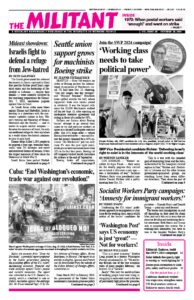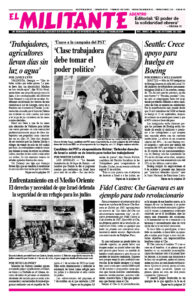Confronting the U.S. rulers’ profit-driven approach to immigration is a key issue for the working class, one in which neither of the bosses’ candidates for president — Kamala Harris and Donald Trump — point any road forward.
The bosses turn immigration on and off depending on their need for cheap labor, and carry this out in ways that are aimed at dividing and weakening the labor movement. Both Harris and Trump seek to perpetuate this system. For a working-class alternative, you have to turn to the Socialist Workers Party’s program and its candidates, Rachele Fruit for president and Dennis Richter for vice president.
The pace of immigration — both legal and not — is determined by the ups and downs of the bosses’ demands for a layer of workers with second-class status who they can superexploit. And it is fueled by the economic crisis and political turmoil facing hundreds of millions of working people in less developed capitalist countries whose economies are dominated by U.S. and other imperialist powers.
When the capitalist economy expands, the bosses seek workers without papers by the millions. They pay these workers less and force them to work longer, harder and in more dangerous conditions. This is one of the strongest weapons the U.S. rulers have to attack the wages and conditions of all workers.
Taking on the bosses’ attempts to set workers with and without papers against each other is decisive for working people. It’s key to strengthening our unions and organizing the unorganized.
The consequences of not doing so can be seen in the construction industry in New York, which was close to 100% union a few decades ago. Today the bosses’ Associated Builders and Contractors gloats that with an influx of immigrants 80% of New York construction workers in private industry do not belong to a union. And accidents and deaths have mushroomed.
There have been a number of examples of native-born and foreign-born workers standing together in recent union struggles. In strikes by hotel workers in California last year, the unionists succeeded in forcing hotel bosses to stop using the government’s E-Verify system to target immigrant workers.
In the course of union struggles, workers begin to recognize we’re bound together by our common class interests.
Amnesty for immigrant workers
Contrary to the demonization of immigrants as “criminals” and “moochers” advanced by many capitalist politicians, the vast majority of immigrants are working people looking to escape poverty and violence to make a living and raise a family.
The Socialist Workers Party candidates explain that a political fight by the labor movement for an amnesty for all undocumented workers in the U.S. is vital. It’s needed to end the pariah status that millions live under and to open the door to drawing more workers into the unions and the class struggle.
At the same time, the SWP opposes an open border under capitalism, which would only worsen the competition the working class faces.
Immigration has risen in recent years, as bosses have sought more workers. The estimated number of undocumented immigrants in the labor force rose from 7.4 million in 2019 to 8.3 million in 2022, the Pew Research Center reports. After the pandemic President Joseph Biden obliged employers by lifting a number of restrictions on immigration and backing off on deportations of those seeking refugee status.
Bosses at food manufacturer Fourth Street Foods in Charleroi, a town of a little over 4,000 in Pennsylvania, couldn’t get enough new hires after COVID-19 struck. But when the government granted Temporary Protected Status to Haitian immigrants, some 2,000 moved to the town. Bosses filled jobs at the factory on wages that start at $12 an hour.
Governments at all levels do next to nothing to address the needs of these newly arrived workers for housing, health care, child care and schools, exacerbating the shortage of essential services that all workers face.
In Springfield, Ohio, a community health clinic reported a 13-fold increase in Haitian patients between 2021 and 2023 after the local government and bosses looked for cheap labor to fill factory and warehouse jobs in the city, attracting Haitian immigrants.
Trump seizes on the competition among workers for jobs, housing and health care to vilify immigrants and to scapegoat them for a crisis that is actually created by the bosses’ drive for profit. He says newly arrived immigrants are a special danger to the jobs of Black and Latino workers.
He smears immigrants as “criminals,” pushes reactionary myths that they’re “poisoning the blood of our country” and calls for “the largest deportation in American history.” He says he will deny the right to a hearing for immigrants accused of being gang members.
At the same time, he calls for a big expansion of legal immigration to meet the bosses’ needs.
Harris poses as more humane. But she increasingly tries to vie with Trump as a hard-line opponent of immigration. She says she’ll draw on her experience as a prosecutor to deal with undocumented workers. In a campaign photo-op at the U.S.-Mexico border Sept. 27, she said under her presidency, workers without papers “will be apprehended and removed and barred from reentering for five years.”
Harris says she’ll expand restrictions adopted by Biden on asylum claims, hire more border guards and immigration judges, and pass laws so that anyone without papers can be charged with a felony. Just like Trump, her proposals would reinforce the second-class status of undocumented workers, deepening divisions in the working class.
A road to unify working people
Competition for jobs, housing and essential services is a permanent condition for working people under capitalism. Bosses try to intensify every antagonism between workers, including by fostering anti-immigrant prejudice. Without a fight by the unions to defend all working people, including those without papers, the scapegoating of undocumented immigrants gets an echo among some workers.
The Democratic and Republican candidates seek to assure the bosses get the cheap labor they need and simultaneously threaten workers without papers. This underscores the pressing need for unions to organize independently of the bosses’ two main parties and establish a party of labor to organize all working people.
Far from turning on fellow workers from abroad, the working class needs a program to unite workers in the U.S. That starts from fighting for protection from the twin scourges of joblessness and high prices. When the next economic downturn hits, competition for jobs will intensify and the anti-immigrant demagogy of capitalist politicians will sharpen.
The SWP calls for a union-led fight for a government-funded public works program to provide millions of jobs — at union-scale wages — building the houses, hospitals, schools and other things we sorely need. This would be coupled with fighting to shorten the workday — with no cut in pay — to spread jobs around and prevent layoffs.
And we need to win cost-of-living adjustments in all union contracts, and social programs like Social Security, to ensure that when prices rise, our wages go up to match.
These demands would encroach on the profits and prerogatives of the employing class who would fight hard to prevent them from being won. Their resolve to stop workers getting what is needed to sustain ourselves and families points to the necessity of working people taking political power into our own hands.

